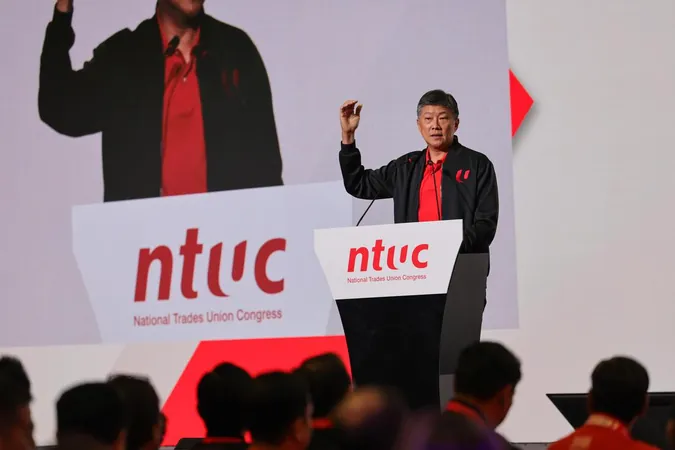
NTUC Urges Government to Boost Funding for Job Enhancement Program: Ng Chee Meng Speaks Out
2025-01-10
Author: John Tan
Introduction
SINGAPORE – The National Trades Union Congress (NTUC) has made a compelling case for increased government funding to enhance an existing grant program designed to help companies optimize their business processes and offer better job opportunities for workers.
Since its launch in 2022, over 85% of the total $100 million allocated for the Company Training Committee (CTC) Grant has been reserved for approved projects, showcasing its widespread impact. By the end of 2024, approximately 480 projects from more than 330 companies had received approval.
Advocacy for CTC Grant
NTUC Secretary-General Ng Chee Meng revealed these findings during a jobs fair organized by the labor movement on January 10th. He emphasized, “We hope the Government recognizes the value of the CTC Grant and partners with NTUC again to elevate businesses to new heights, which in turn will support our workforce.”
Mr. Ng highlighted the critical role of good employers—those with visionary leadership and ethical business practices—stressing that when businesses thrive, they provide vital job opportunities for Singaporeans. The initiative is projected to benefit over 7,400 workers, potentially translating to an average wage increase of 5% or clearer pathways to career advancement.
Background of CTC Program
This grant is part of a broader CTC program initiated in 2019, which encourages companies to collaborate with unions and industry experts to identify the skills needed for employees to stay competitive in a rapidly evolving job market. Through the grant, companies can receive funding that covers up to 70% of qualifying costs aimed at improving productivity, job redesign, and employee skill development.
Addressing Job Security
At the NTUC Career Festival held at the Marina Bay Sands Expo and Convention Centre, Mr. Ng addressed the pressing issue of job security among Singapore workers. A recent NTUC survey revealed that 34% of respondents reported anxieties about potential job losses within the next three months. Although Singapore’s economy is operating at full employment, the ongoing restructuring has led to an unsettling churn in the labor market.
“The churn we observe may lead to anxiety, but how we respond is crucial. With this transformation, more opportunities and better jobs will emerge,” he stated. Mr. Ng pointed out that by upskilling workers and enhancing productivity, Singaporeans can successfully navigate these changes and seize new opportunities alongside businesses.
Impact of Technology
In his address, he noted the growing influence of technology—particularly generative artificial intelligence (AI)—in reshaping job roles and employer needs. He suggested that, with adequate support, these technological advancements could turn into significant opportunities for job seekers.
Mentoring Network
To further bolster support for workers, the labor movement is also introducing a new mentors' network, bringing together 1,100 mentors from various existing programs targeting mid-career professionals, young workers, and women. Many professionals expressed challenges in identifying necessary training for career goals, highlighting the need for experienced mentors to provide direction.
Employer Showcase
One of the showcased employers at the jobs fair was Grenadier, a company specializing in promotional materials for clients like supermarkets. With existing staff of over 70, they are seeking to expand their team across multiple positions, including account executives, project management executives, and carpentry supervisors. Managing Director Kelvin Lim shared his optimism, stating, “There seems to be quite a lot of interest in the positions we are offering, and I’m hopeful we’ll fill these roles.”
Job Seekers' Perspectives
Among the attendees was 67-year-old job seeker Magdalene Toh, who expressed her desire for employment that allows social interaction and mental engagement. Having spent over 30 years working internationally in the furniture manufacturing sector before retiring, Toh aims to find an employer who appreciates her extensive experience abroad.
Conclusion
With such ongoing initiatives and supportive networks, Singapore is poised to empower its workforce to embrace new opportunities in an ever-evolving economic landscape. Stay tuned as NTUC continues to advocate for the prosperity of both workers and employers in the years to come!





 Brasil (PT)
Brasil (PT)
 Canada (EN)
Canada (EN)
 Chile (ES)
Chile (ES)
 Česko (CS)
Česko (CS)
 대한민국 (KO)
대한민국 (KO)
 España (ES)
España (ES)
 France (FR)
France (FR)
 Hong Kong (EN)
Hong Kong (EN)
 Italia (IT)
Italia (IT)
 日本 (JA)
日本 (JA)
 Magyarország (HU)
Magyarország (HU)
 Norge (NO)
Norge (NO)
 Polska (PL)
Polska (PL)
 Schweiz (DE)
Schweiz (DE)
 Singapore (EN)
Singapore (EN)
 Sverige (SV)
Sverige (SV)
 Suomi (FI)
Suomi (FI)
 Türkiye (TR)
Türkiye (TR)